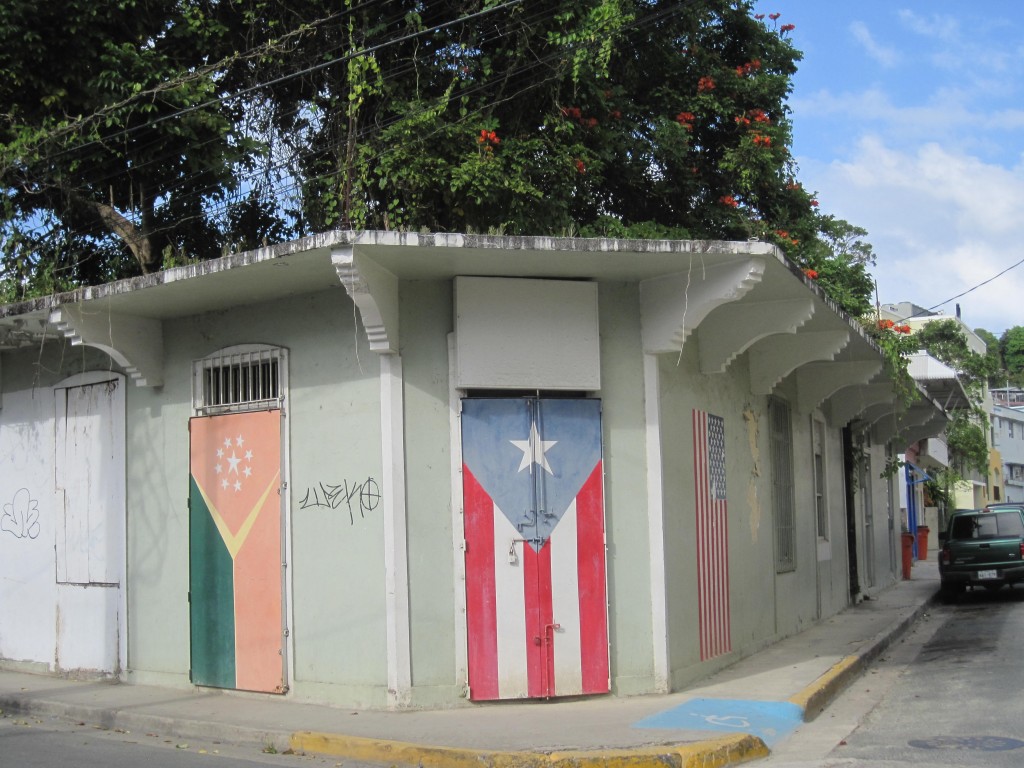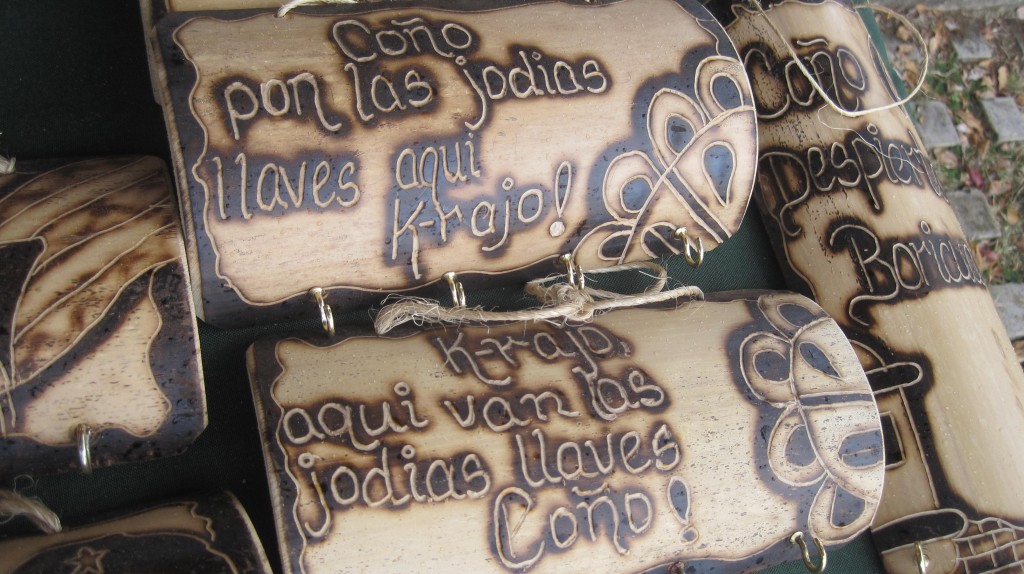We get a lot of questions from people who have never been to Puerto Rico about whether Spanish is necessary to get by around here. While Puerto Rico officially has two languages (Spanish and English), Spanish is by far the main or default language. An English-speaking person can get by pretty well, especially in areas that have either a lot of “gringos” or what Puerto Ricans call “Americanos” (even though Puerto Ricans are also technically Americans as well) or where the Puerto Ricans are either well-traveled and/or more highly educated.

Rincón, Puerto Rico, and US flags
However, it is good to know at least a little Spanish in Puerto Rico.
I learned Spanish in school as well as traveling and living in Mexico, so my Spanish has had a definite Mexican bent to it. Coming to Puerto Rico, my Mexican Spanish began to show when I used certain words. At one point as I was talking, a Puerto Rican said I had a Mexican accent which surprised me because I thought I would have an Amercian English accent to my Spanish. So I have been listening more and changing my Spanish to acculturate better to the local dialect. My Mexican dialect is understandable but there are certain words that I would get a strange look if I used much like an Englishman would get if he used the words loo, bonnet and fag to mean toilet, car hood or cigarette.
So here are a few words and things I have noticed about Puerto Rican Spanish that may help in communicating here. Please add any others and I will try and think of more and keep an ear out for others as I hear them!
Aspiration of the “s” sometimes the “n” and occasions of Rr as an j
This can make words like gracias (thank you) sound more like gracia.
This can also make whole phrases like “¿Están Listos?” (Are you ready?) sound more like ¿Talito?
Another example was hearing ajó instead of arroz (rice) which made me think they were saying garlic (ajo).
Similarly, words often seem more jumbled together.
For instance, at a restaurant I heard “Mesa Parado” and in my confusion of trying to comprehend I thought they were asking if we wanted a cocktail standing table or to be on the standing list or something but finally I figured it out that the host was actually saying “Mesa Para Dos” (table for two)
Spanglish
In Colorado, you would hear a lot of Spanglish which is a combination of English and Spanish, but in Puerto Rico it is very distinct and very common. You may see Parking (pronounced Par-keen) just as often as Estacionamiento. A walk-in closet is written as a “walking closet” which makes me imagine a closet walking around. To complicate things even further, the Nuyoricans (Ethnically Puerto Ricans from New York) have an even more complicated Spanglish that I still haven’t quite figured out.
Mande is not used!
In Mexico, I was corrected a few times when I would say “¿Qué?” (What?) that I should say “Mande” instead. Then when I came to Puerto Rico, I got lots of strange looks when I misunderstood or couldn’t quite hear and I said Mande. I quickly learned that I should use ¿Cómo? instead.
Con Permiso and A la Orden
Instead of disculpe or perdón, use con permiso (excuse me) if you need to get around someone in a store for instance. You should wait because often someone will say Permiso back to you. This would be like saying “Pardon me” in English and someone replying “You’re pardoned”. It was funny to me the first time we heard it.
A la orden is basically “you’re welcome” but it is closer to At your service and is said after someone asks for something or says gracias.
¡Wepa!
Wepa is an expression you might hear in Puerto Rico. It is like woohoo or yeehaw or hellya or some other expression of joy and excitement.
Boricua/Borinkén
Boricua is the Taino (native indigenous people of the island) word for Puerto Rican. It is a prideful word as is the original Taino word for the island which is Borinkén.
Jíbaro
Jíbaro (also seen in the diminutive as jíbarito/a) is an old term for the country folks of Puerto Rico. Perhaps a loose translation could be hillbilly. It is often pejorative, though lately it is gaining traction as more people view farming and the “old ways” with more reverence.
Cuss words
Cuss words in Puerto Rico, surprisingly, are a little different than in Mexico. Whereas in Mexico the verb “Chingar” is the favored cuss word used for most anything vulgar, here in Puerto Rico it is Coño or Joderse as well as carajo. There seems to be almost a sense of pride in using these as I have seen many a bumper sticker and even artisanal work with these!
Random words:
Goma means tire or eraser whereas in MX it was llanta or borrador
Guineo means banana and Plátano means Plantain. In MX it was either banana or platano for either
China means orange. In MX it was naranja. The first time I heard “Jugo de china” I thought it was some sort of juice from China! lol There is also naranja in Puerto Rico, but it is a sour orange.
Guagua is pretty much any large vehicle including a bus.
As you can imagine, Puerto Rican Spanish has been a lot of fun to learn and I look forward to learning even more!


As I read this I laughed. My husband is from Mexico. His family moved to NJ when he was 13, to a predominantly Puerto Rican neighborhood. He went through culture and language shock. Then when he and I started dating I went through my own language shock realizing certain words meant something else. For example, ahorita to us PRicans means later while for Mexicans it means right now….well imagine the look on my mother-in-law’s face when i would answer ahorita and she sat there waiting & expecting something right away. Needless to say after 24 years of being together we speak Boriciuano….which is our own combo of Mexican and Puerto Rican. Also, he cooks the Puerto Rican food and I cook Mexican.
When hearing “con permiso” or simply “permiso”, the proper response is to step aside and say “concedido”. Also “mande” IS used, usually as a response by a subordinate to a superior, or as a response to an older person, respectfully. — Fran
Haha Leslie! Yes the Puerto Rican/Mexican thing always trips me up. And it seems that whichever you learned first you think is the “right” way to say something. I didn’t realize that about ahorita! I always used it the Mexican way…meaning right now!I will have to remember that one! Funny about switching up the food too!
Fran,
As always, thanks for your clarifications! I have never heard concedido before though as a response to con permiso, so I will have to listen for that! Thanks for the info about mande too. It seemed that the way I was using it (to clarify what I just heard) was coming across as rude or strange in some way, so what you describe makes sense… Language is always so fascinating and potentially confusing or awkward 🙂
You can definitely respond with concedido when somebody says permiso but pase, adelante, and even disculpe and perdone are also common.
About using mande as a response, however, I’m with Cassie on this one. I’ve lived for 3 and a half decades on the island and I can probably count the times that I’ve heard it being used (non jokingly) as a response with a single hand. If I call a Puerto Rican kid to send him on an errand he will never respond with mande, as Mexicans do, unless he’s watched too much Discovery Kids. (It happens.) But you can use mande in Puerto Rico it in the following manner: “¿Mira Pepito, acaso no te mandé a buscarme las llaves?” You can also use it like this: “Dile a Pepito que me mande las llaves con su tía.” And if you need to use it as a response consider using the word diga instead and no one will look at you weirdly.
And about who uses the correct variant of Spanish, it’s clearly Puerto Ricans. 😉 Canarians and Andalusians come second for obvious reasons.
Have you ever heard of dialect? Every country that speaks the same language eventually develops their own dialect. Your either dense or don’t understand the metamorphosis of culture concerning language.
¡Gracia(s) Adolfo!
Yah, exactly! With mande, I don’t mean that the verb mandar isn’t used (like enviar), just using mande for what you say when you didn’t hear something well. Y K-rajo, pobre Pepito con las jodias llaves 🙂
I was thinking about the mesa para dos a little more. It was so jumbled it sounded like mesaparado. It took me completely off guard…mes aparado? You want to arrange my month? mesa parado? Wait, what?
But I am sure people here think I sound very formal when I separate every word and when I don’t turn the “ado” into “ao” also. 🙂 Should we say we are from Colorao?
As for the correct variant of Spanish…I know many a Mexican who think Puerto Rican Spanish is a completely different language into itself!
Though I do admit that cacahuate is a much stranger/funnier word than maní!
¡Andale, pues! Y !Olé!
Mande was not used in Guatemala or Spain in the same way as Mexico, either. You can elicit a giggle or wierd look when using it, and folks told me it was an antiquated use from colonial days. China for naranjo is interesting, as oranges probably came in the old days from the orient. Estaciamento on the other hand is a relatively new term from Spain and probably introduced post conquista in PR. Have heard the common names coche and auto for cars as well as automóvile, but guagua only in Guatemala.
China is interesting at it refers to a specific type of variant of naranja. Naranja china or naranja de China. It’s in the RAE dictionary and it was the most common type and sought after sweet orange. So that is why we call our sweet oranges china in Puerto Rico.
As a Puerto Rican New Yorker finally catching up on Spanish, this is very helpful. Thanks!
Ok, we call it china not because the china is sour, we call it china because back in the days the crates that the Europeans had written china all over it, and do you that the male coqui sings coqui and do you know the female coqui sings co-co- qui